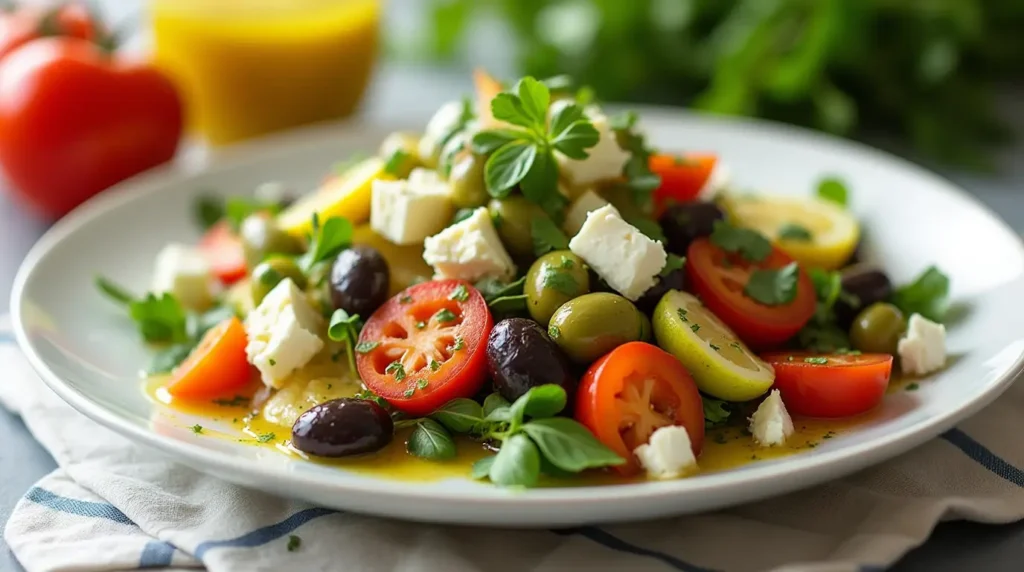Greek Lemon Vinaigrette is a culinary treasure that embodies the vibrant, fresh flavors of the Mediterranean. This versatile dressing is more than just a topping for salads it’s a burst of zesty goodness that elevates any dish, from roasted vegetables to grilled meats. Whether you’re a fan of traditional Greek cuisine or simply looking for a quick, flavorful addition to your meals, this Greek Lemon Vinaigrette recipe is a must-have in your kitchen repertoire. With its perfect blend of tangy lemon, rich olive oil, and aromatic herbs, this dressing promises to bring authentic Mediterranean flair to your table.
In this article, we’ll explore what makes this vinaigrette truly the best, guide you step-by-step on how to create it, and share expert tips for ensuring authentic flavor every time. Let’s dive into the world of Greek Lemon Vinaigrette and discover how to make your meals unforgettable!
Table of Contents
What Makes This the Best Greek Lemon Vinaigrette Recipe?
Greek Lemon Vinaigrette is a culinary gem that transforms any dish into a burst of Mediterranean goodness. What sets the best Greek Lemon Vinaigrette recipe apart is its perfect balance of tangy citrus, robust olive oil, and aromatic herbs. Together, these ingredients create a harmonious blend that complements salads, roasted vegetables, or grilled meats. Consequently, this isn’t just any dressing it’s a versatile, flavorful masterpiece that embodies the essence of Greek cuisine.

“Extra virgin olive oil is a cornerstone of the Mediterranean diet and offers numerous health benefits, such as improving heart health (source).”
A Symphony of Authentic Ingredients
The hallmark of an authentic Greek Lemon Vinaigrette recipe is its use of high-quality, traditional ingredients. For instance, extra virgin olive oil, fresh lemon juice, garlic, and a medley of herbs like oregano and thyme come together to create a dressing that’s as close to the Mediterranean shores as you can get. Thus, using these ingredients ensures every drop of vinaigrette is packed with flavor and nutrients, making it a standout among other dressings.
The fresh lemon juice provides the tangy zest that gives this vinaigrette its signature flavor, while olive oil adds a rich, smooth texture. Meanwhile, garlic lends a pungent kick, and the herbs tie it all together with earthy, aromatic notes. When these components are combined, the result is nothing short of culinary magic.
Why This Recipe Stands Out
This Greek Lemon Vinaigrette recipe is the best for several reasons:
- Simplicity Meets Authenticity: The recipe uses simple ingredients; however, each one is authentic to Greek cooking traditions.
- Perfect for Various Dishes: Whether drizzled over a Greek salad, used as a marinade for chicken, or tossed with roasted vegetables, it consistently elevates any dish it touches.
- Customizable Flavor Profile: You can easily tweak the ratios to suit your taste. For example, if you prefer a tangier vinaigrette, add more lemon juice. Love garlic? Simply throw in an extra clove.
- Health Benefits: This dressing is naturally rich in healthy fats, antioxidants, and vitamin C, making it a nutritious choice for those seeking wholesome, flavorful meals.
The Secret is in the Technique
What truly makes this vinaigrette special is the emulsification process. By slowly whisking the olive oil into the lemon juice mixture, you create a creamy, cohesive dressing that clings beautifully to your greens or proteins. Furthermore, this technique, combined with the freshest ingredients, ensures superior flavor and texture.
A Culinary Staple with Endless Possibilities
Greek Lemon Vinaigrette isn’t just a salad dressing; instead, it’s a gateway to exploring the vibrant flavors of Mediterranean cooking. Its versatility means it can double as a marinade for chicken or fish, a drizzle for grilled vegetables, or even a dip for fresh bread. Moreover, the recipe bridges the gap between traditional Greek flavors and modern culinary creativity.
How to Make Greek Lemon Vinaigrette in Just a Few Steps
Making Greek Lemon Vinaigrette at home is not only rewarding but also incredibly simple. By using just a few fresh, high-quality ingredients, you can easily create a dressing that surpasses any store-bought version. Whether you’re an experienced cook or just starting out, this recipe is quick, foolproof, and guaranteed to elevate your meals.

The Ingredients: Simple, Fresh, and Authentic
To craft the best Greek Lemon Vinaigrette, you’ll need the following essential ingredients:
- Extra Virgin Olive Oil (½ cup): Choose a high-quality variety for a smooth and rich flavor.
- Fresh Lemon Juice (¼ cup): Freshly squeezed lemons provide the vibrant tanginess that defines this dressing.
- Dijon Mustard (1 teaspoon): Not only does it add a subtle tang, but it also aids in emulsification.
- Garlic (1 clove, finely minced): This ingredient brings a savory depth of flavor.
- Dried Oregano (1 teaspoon): A staple herb for authentic Greek taste.
- Honey or Maple Syrup (1 teaspoon): Balances the tang with a hint of sweetness.
- Salt and Black Pepper (to taste): These basics enhance and tie together the flavors.
Step-by-Step Recipe
1. Prepare Your Ingredients
First and foremost, measure and gather all the ingredients. Using freshly squeezed lemon juice and finely minced garlic ensures that the flavors are vibrant and evenly distributed.
2. Combine the Base Ingredients
Next, in a medium-sized bowl, whisk together the lemon juice, Dijon mustard, minced garlic, dried oregano, honey, salt, and pepper. This step is essential for melding the base flavors before incorporating the oil.
3. Emulsify the Vinaigrette
Then, while continuously whisking, slowly drizzle in the olive oil. This gradual method ensures the oil blends smoothly with the lemon mixture, creating a creamy, cohesive dressing. Alternatively, for added convenience, you can use a blender or shake everything in a jar.
4. Taste and Adjust
After emulsifying, taste the vinaigrette and adjust the seasoning as needed. If it’s too tangy, add a splash of olive oil. Conversely, if you prefer more zest, mix in a few extra drops of lemon juice.
5. Store or Serve
Finally, transfer the vinaigrette to a clean jar or bottle. Store it in the refrigerator for up to a week, but remember to shake well before using, as natural separation may occur.
Why This Recipe Works Every Time
This Greek Lemon Vinaigrette consistently delivers delicious results due to its balanced blend of tangy, sweet, and savory flavors. The Dijon mustard acts as a natural emulsifier, preventing the mixture from separating. Furthermore, the honey helps mellow the sharpness of the lemon and garlic. By slowly incorporating the olive oil, you achieve a creamy texture that clings beautifully to salads or proteins.
Delicious Ways to Use Greek Lemon Vinaigrette
This versatile dressing pairs perfectly with numerous dishes:
- Salads: For example, toss it with mixed greens, cucumbers, tomatoes, and feta to create a classic Greek salad.
- Marinades: Use it to marinate chicken, fish, or tofu for a zesty, flavorful result.
- Vegetables: Additionally, drizzle it over roasted or grilled vegetables such as zucchini, asparagus, or eggplant.
- Bread Dip: Pair it with fresh pita or crusty bread for a simple yet flavorful appetizer.
With these steps, you’ll be able to enjoy a perfectly balanced Greek Lemon Vinaigrette. Now, let’s explore some tips to ensure you achieve authentic, delicious results every single time!
Easy Tips for Creating an Authentic Greek Vinaigrette at Home
Crafting an authentic Greek lemon vinaigrette isn’t just about following a recipe it’s about embracing the techniques, ingredients, and traditions that make this dressing a Mediterranean classic. With a few simple tips, you can consistently create a vinaigrette that delivers the perfect balance of flavor and texture.

1. Use High-Quality Ingredients
The essence of any authentic Greek lemon vinaigrette recipe lies in the quality of its ingredients. Greek cuisine emphasizes simplicity, which means every component plays a vital role. Here’s how to choose the best ingredients:
- Extra Virgin Olive Oil: Opt for cold-pressed, extra virgin olive oil, ideally from Greece or a trusted Mediterranean source. Its robust, fruity flavor is essential for an authentic taste.
- Fresh Lemons: Always use freshly squeezed lemon juice instead of bottled. Fresh lemons provide a vibrant, zesty flavor that’s irreplaceable.
- Garlic: Use fresh garlic cloves for a sharp, pungent kick. Avoid pre-minced garlic, as it lacks the intensity and aroma of fresh.
- Oregano: Authentic Greek oregano, whether fresh or dried, imparts a distinct earthy flavor that elevates the vinaigrette.
2. Master the Art of Emulsification
One of the keys to achieving the best Greek lemon vinaigrette is creating a stable emulsion a mixture where the oil and lemon juice blend seamlessly:
- Whisk Continuously: As you slowly drizzle the olive oil into the lemon mixture, whisk vigorously to ensure the ingredients bind together.
- Use Dijon Mustard: Adding a small amount of Dijon mustard not only enhances the flavor but also acts as a natural emulsifier.
- Blender or Jar Method: For foolproof emulsification, use a blender or shake the vinaigrette in a sealed jar. Both methods create a creamy consistency with minimal effort.
3. Adjust to Your Taste
Greek vinaigrette is highly customizable, allowing you to tweak the flavors to suit your preferences:
- Tanginess: Add more lemon juice for an extra tangy profile.
- Sweetness: If the lemon is too sharp, balance it with an additional drizzle of honey or maple syrup.
- Herbs: Experiment with adding other Mediterranean herbs like thyme or basil for a unique twist.
- Spice: For a hint of heat, include a pinch of red pepper flakes.
4. Store It Properly
Homemade Greek lemon vinaigrette is best enjoyed fresh, but it can be stored for later use with proper care:
- Refrigeration: Store the vinaigrette in a tightly sealed jar or bottle in the refrigerator for up to a week.
- Shake Before Use: Natural separation occurs when stored, so always shake well before serving.
- Room Temperature: If the olive oil solidifies in the fridge, let the vinaigrette sit at room temperature for a few minutes to liquefy.
5. Pair It with Mediterranean Dishes
Authentic Greek lemon vinaigrette shines when paired with classic Mediterranean flavors. Use it as:
- Salad Dressing: Toss it with fresh vegetables, olives, and feta for a traditional Greek salad.
- Marinade: Enhance the flavor of chicken, lamb, or seafood by using the vinaigrette as a marinade.
- Drizzle: Pour it over roasted potatoes or grains like quinoa for a quick flavor boost.
- Dip: Serve it alongside hummus, tzatziki, or warm pita bread for an irresistible appetizer.
6. Make It Your Signature Dressing
One of the joys of homemade vinaigrette is the ability to make it your own. By experimenting with ingredients and techniques, you can create a dressing that becomes your go-to for every occasion.
With these tips, you’re well-equipped to prepare a Greek lemon vinaigrette that’s bursting with authentic flavor and perfect for any meal.
Conclusion
Greek Lemon Vinaigrette is a testament to the power of simple, high-quality ingredients. With its vibrant citrus tang, smooth olive oil richness, and the aromatic touch of oregano, this dressing encapsulates the essence of Mediterranean cooking. Whether you’re tossing it with a fresh salad, using it as a marinade, or drizzling it over roasted veggies, this versatile vinaigrette enhances the flavors of any dish it graces.
By mastering this easy and authentic recipe, you’ll have a go-to dressing that’s perfect for weeknight dinners, meal preps, or entertaining guests. Its adaptability and bold flavor profile make it a staple for anyone looking to bring a taste of Greece into their home kitchen. So grab your fresh lemons and olive oil, and let this Greek Lemon Vinaigrette recipe transform your meals into a Mediterranean feast!
FAQs About Greek Lemon Vinaigrette
Can I Make Greek Lemon Vinaigrette Ahead of Time?
Yes, Greek Lemon Vinaigrette can be made ahead and stored in an airtight container in the refrigerator for up to one week. However, make sure to shake or whisk it well before each use, as the ingredients may naturally separate over time.
What Dishes Pair Well With Greek Lemon Vinaigrette?
This vinaigrette is incredibly versatile! For instance, it pairs beautifully with Greek salads, roasted vegetables, grilled chicken, or fish. Additionally, it works as a dipping sauce for bread. Its bright, zesty flavor also serves well as a marinade for meats or tofu.
How Can I Adjust the Flavor of the Vinaigrette?
You can easily tweak the vinaigrette to suit your taste:
- If you want more tang, add extra lemon juice.
- To mellow the acidity, add a bit more honey or maple syrup.
- Moreover, increase the oregano or add other Mediterranean herbs like thyme or basil for a stronger herb flavor.
What Type of Olive Oil Is Best for Greek Lemon Vinaigrette?
Extra virgin olive oil is the best choice for its robust, fruity flavor and smooth texture. In fact, for an authentic touch, you might try using Greek olive oil, which has a rich, peppery taste that complements the dressing beautifully.
Can I Use This Vinaigrette as a Marinade?
Absolutely! Greek Lemon Vinaigrette makes an excellent marinade for chicken, fish, or vegetables. Because the acidity from the lemon juice helps tenderize proteins, the olive oil and herbs enhance the flavor beautifully.
Is This Vinaigrette Healthy?
Yes, this vinaigrette is naturally healthy. Not only is it rich in healthy fats from olive oil, but it’s also packed with antioxidants from the herbs and vitamin C from the lemon juice. Therefore, it’s a great option for those seeking nutrient-dense dressings.
Can I Make This Vinaigrette Vegan?
Yes, to make it vegan, simply substitute the honey with maple syrup or agave nectar. Consequently, the flavor and consistency will remain just as delightful.
Why Does My Vinaigrette Separate, and How Can I Fix It?
Separation is natural in vinaigrettes since oil and water-based ingredients don’t naturally mix. To address this, shake or whisk the vinaigrette before serving. Additionally, adding a small amount of Dijon mustard can help stabilize the mixture.
How Do I Store Leftover Vinaigrette?
Store leftover vinaigrette in a tightly sealed jar or bottle in the refrigerator. If the olive oil solidifies in the cold, allow the vinaigrette to sit at room temperature for a few minutes. Then, shake or whisk to recombine.
Can I Freeze Greek Lemon Vinaigrette?
It’s not recommended to freeze vinaigrettes containing olive oil, as freezing can affect the texture and flavor. Instead, this vinaigrette is best enjoyed fresh or within its one-week refrigerated shelf life.

